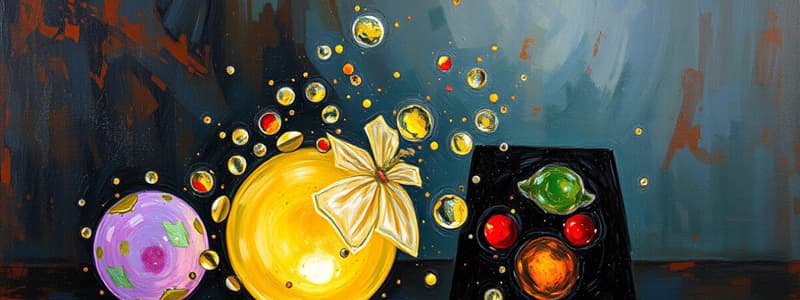Podcast
Questions and Answers
What type of matter is lemonade classified as?
What type of matter is lemonade classified as?
- Mixture (correct)
- Element
- Solution
- Compound
What distinguishes a compound from a mixture?
What distinguishes a compound from a mixture?
- Compounds consist of different elements in fixed proportions. (correct)
- Mixtures always form new substances.
- Compounds can vary in their composition.
- Mixtures do not contain any elements.
Which of the following is an example of a homogeneous mixture?
Which of the following is an example of a homogeneous mixture?
- A salad
- A rock
- Salt water (correct)
- Lemonade with pulp
What are the properties of the substances in a mixture?
What are the properties of the substances in a mixture?
What is an example of a heterogeneous mixture?
What is an example of a heterogeneous mixture?
Which of these statements about mixtures is true?
Which of these statements about mixtures is true?
What is the composition of air considered?
What is the composition of air considered?
How do the particles in mixtures affect their properties?
How do the particles in mixtures affect their properties?
Which of the following statements best describes a mixture?
Which of the following statements best describes a mixture?
Which of the following is NOT a characteristic of mixtures?
Which of the following is NOT a characteristic of mixtures?
Which type of mixture retains the physical properties of its components and does not combine chemically?
Which type of mixture retains the physical properties of its components and does not combine chemically?
What differentiates a colloid from a solution?
What differentiates a colloid from a solution?
What process can be used to separate salt from saltwater?
What process can be used to separate salt from saltwater?
Which of the following is an example of a suspension?
Which of the following is an example of a suspension?
Which statement about solutions is true?
Which statement about solutions is true?
Which of the following mixtures is classified as a heterogeneous mixture?
Which of the following mixtures is classified as a heterogeneous mixture?
How can you separate iron filings from sand?
How can you separate iron filings from sand?
What is the effect of homogenization on milk?
What is the effect of homogenization on milk?
Which type of mixture would settle out over time when left undisturbed?
Which type of mixture would settle out over time when left undisturbed?
Which physical property is essential for separating components of mixtures like salt and pepper?
Which physical property is essential for separating components of mixtures like salt and pepper?
Lemonade is a homogeneous mixture without pulp.
Lemonade is a homogeneous mixture without pulp.
Mixtures consist of substances that combine chemically to form new substances.
Mixtures consist of substances that combine chemically to form new substances.
Salt water is a homogeneous mixture with a consistent proportion of salt.
Salt water is a homogeneous mixture with a consistent proportion of salt.
A rock is classified as a homogeneous mixture due to its consistent composition.
A rock is classified as a homogeneous mixture due to its consistent composition.
Air is a mixture primarily composed of helium and oxygen.
Air is a mixture primarily composed of helium and oxygen.
A solution is a homogeneous mixture with particles that are too large to be filtered out.
A solution is a homogeneous mixture with particles that are too large to be filtered out.
Colloids consist of large particles that can be seen and will settle out of the mixture over time.
Colloids consist of large particles that can be seen and will settle out of the mixture over time.
Homogenized milk is an example of a colloid, as the cream does not separate out.
Homogenized milk is an example of a colloid, as the cream does not separate out.
A suspension can be separated by filtering because its particles are large enough to settle.
A suspension can be separated by filtering because its particles are large enough to settle.
Salt and pepper can be separated through filtration because salt dissolves in water while pepper does not.
Salt and pepper can be separated through filtration because salt dissolves in water while pepper does not.
Flashcards
Mixture
Mixture
A substance formed by combining two or more substances without chemical bonding, in any proportion.
Homogeneous Mixture
Homogeneous Mixture
A mixture with a uniform composition throughout.
Heterogeneous Mixture
Heterogeneous Mixture
A mixture with a varying composition throughout.
Solution
Solution
Signup and view all the flashcards
Colloid
Colloid
Signup and view all the flashcards
Suspension
Suspension
Signup and view all the flashcards
Separation of Mixtures
Separation of Mixtures
Signup and view all the flashcards
Evaporation
Evaporation
Signup and view all the flashcards
Filtration
Filtration
Signup and view all the flashcards
Physical Property
Physical Property
Signup and view all the flashcards
Boiling Point
Boiling Point
Signup and view all the flashcards
Solubility
Solubility
Signup and view all the flashcards
Magnet
Magnet
Signup and view all the flashcards
Compound
Compound
Signup and view all the flashcards
Particle size
Particle size
Signup and view all the flashcards
Study Notes
Mixtures
- A mixture is formed by combining two or more substances in any proportion without chemical bonding.
- Mixtures retain the physical properties of their individual components.
- Mixtures can be homogeneous or heterogeneous.
Types of Mixtures
- Homogeneous Mixtures: Uniform composition throughout. Example: lemonade without pulp or salt water (3.5% salt concentration).
- Heterogeneous Mixtures: Composition varies throughout. Example: a rock made up of smaller rocks and minerals.
Classification by Particle Size
- Solutions: Homogeneous mixtures with tiny particles that do not settle or can’t be filtered. Example: Salt dissolved in water.
- Colloids: Heterogeneous mixtures with medium-sized particles that remain suspended. Example: Gelatin dessert.
- Suspensions: Heterogeneous mixtures with larger particles that can settle or be filtered. Example: Salad dressing or paint.
Separation of Mixtures
- Mixture components can be separated by their physical properties, like boiling point or solubility.
- Example: Salt can be separated from saltwater by evaporation, leaving salt deposits behind.
- Example: Salt and pepper can be separated as salt dissolves in water while pepper does not, allowing for filtration.
Summary of Key Concepts
- Mixtures differ from compounds, as compounds consist of elements combined in fixed proportions.
- Physical processes (boiling, filtering) can be used for separation of mixture components.
- Iron filings can be separated from sand using a magnet due to their physical property of magnetism.
Mixtures
- A mixture is formed by combining two or more substances in any proportion without chemical bonding.
- Mixtures retain the physical properties of their individual components.
- Mixtures can be homogeneous or heterogeneous.
Types of Mixtures
- Homogeneous Mixtures: Uniform composition throughout. Example: lemonade without pulp or salt water (3.5% salt concentration).
- Heterogeneous Mixtures: Composition varies throughout. Example: a rock made up of smaller rocks and minerals.
Classification by Particle Size
- Solutions: Homogeneous mixtures with tiny particles that do not settle or can’t be filtered. Example: Salt dissolved in water.
- Colloids: Heterogeneous mixtures with medium-sized particles that remain suspended. Example: Gelatin dessert.
- Suspensions: Heterogeneous mixtures with larger particles that can settle or be filtered. Example: Salad dressing or paint.
Separation of Mixtures
- Mixture components can be separated by their physical properties, like boiling point or solubility.
- Example: Salt can be separated from saltwater by evaporation, leaving salt deposits behind.
- Example: Salt and pepper can be separated as salt dissolves in water while pepper does not, allowing for filtration.
Summary of Key Concepts
- Mixtures differ from compounds, as compounds consist of elements combined in fixed proportions.
- Physical processes (boiling, filtering) can be used for separation of mixture components.
- Iron filings can be separated from sand using a magnet due to their physical property of magnetism.
Studying That Suits You
Use AI to generate personalized quizzes and flashcards to suit your learning preferences.




